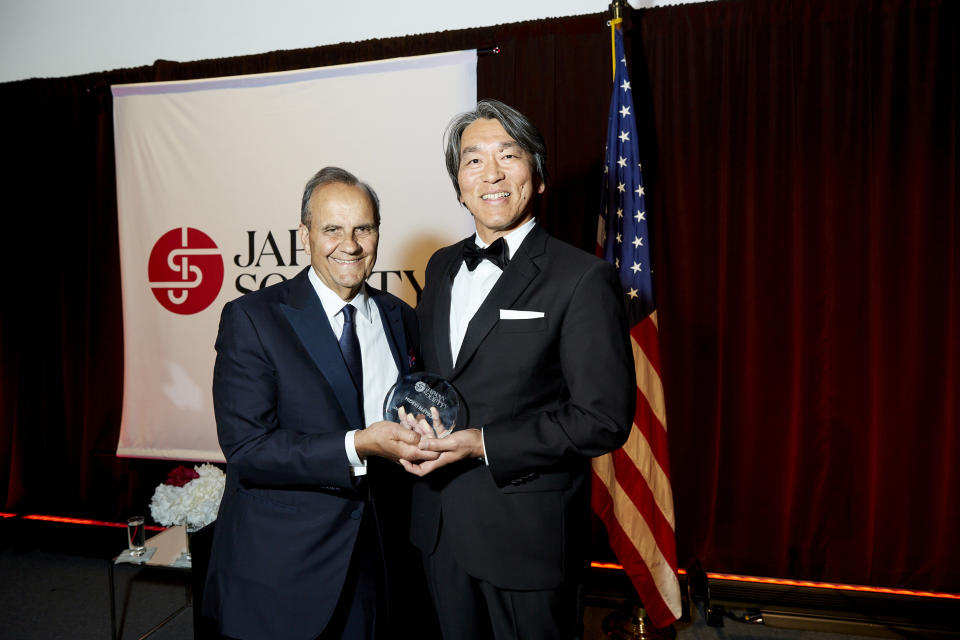Former Yankees slugger Hideki Matsui honored during 150th anniversary of baseball in Japan
Former Yankees slugger Hideki Matsui was honored in New York City for his contributions to baseball and helping build cultural connections between the U.S. and Japan through the game.
Matsui accepted the Japan Society Award from former Yankees manager and Hall of Famer Joe Torre on Tuesday night. The honor given to the two-time All Star coincides with the 150th anniversary of baseball’s introduction to Japan from the U.S.
Torre, Matsui’s manager during the player’s first five years in Major League Baseball, said. “During a time when too often, we have to talk about our differences, I have even more appreciation for those who pull us toward one another instead of away from each other. Hideki Matsui is one of those special people who embodies baseball as a bridge between our cultures.”
The slugger, also a Japanese Baseball Hall of Famer, received the award at an event featuring more than 700 attendees, including New York City Mayor Eric Adams and the secretary of state of New York, Robert J. Rodriguez.
Matsui, who largely spoke through a translator during his 10-year career in the MLB, delivered an acceptance speech in English from memory, recounting his decision to play with the Yankees after a successful career with the Yomiuri Giants. Matsui paid tribute to both Torre and his former manager with the Giants, Shigeo Nagashima, who was an avid fan of fellow legendary Yankees outfielder Joe DiMaggio.
“My career would have been completely different and I would not be standing here today,” he said. “I’d like to express my sincere gratitude to both of them.”
Torre also shared some stories from Matsui’s years with the Yankees, reminiscing on how the former outfielder debuted at Yankee Stadium in 2003, hitting a grand slam against the Minnesota Twins — a foreshadowing for his career with the team that would end as he was deemed World Series MVP in 2009. But the former Yankees manager emphasized that Matsui stands as a memorable figure in baseball largely due to his character.
“He plays the game the right way. And he plays the game hard. He was a great teammate. Never felt that he deserved anything more than the next guy,” Torre said. “He’s such a good guy. He’s generous with his fans. He’s a gentleman who gives back to his community. He represents so many reasons why baseball transcends our differences and resonates all across the world.”
Ryan Reft, historian at the Library of Congress, previously explained to NBC Asian America that at times baseball has been utilized by the U.S., politically, to further the country’s own imperialistic ambitions across Asia. However in Japan, the sport, which was brought to the country in 1872 by Horace Wilson, an American English teacher at the Kaisei Academy in Tokyo, took on a different political function.
Reft said the nation adopted the sport to “express Japan’s place in international standing” during the late 19th century, an era known as the Meiji restoration during which power was “restored” to the emperor and the country pivoted toward industrialization and urbanization. And while the East was stereotyped at the time as “feminine and sensual,” Reft said Japan strategically took on a tradition from the West, which was thought of as “rational and masculine, scientific.”
“Baseball was seen as a way for Japan as a country, and its people, to kind of declare its masculinity,” Reft said.
It wasn’t until 1995, however, that pitcher Hideo Nomo debuted with the Los Angeles Dodgers, ushering in a new wave of Japanese talent that would include Matsui.


